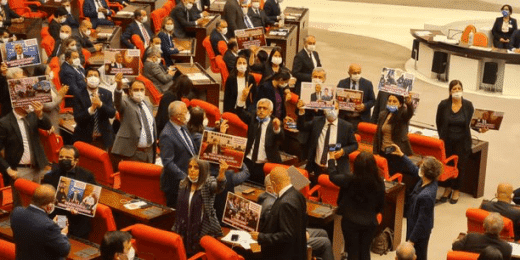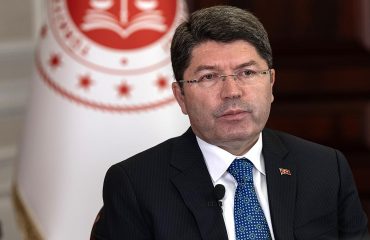

Hours after the removal of one of its MPs, Ömer Faruk Gergerlioğlu from the parliament on March 17, the Chief Prosecutor of the Supreme Court of Appeals filed a lawsuit for the closure of the Kurdish-problem-focused Peoples’ Democratic Party (HDP). In the indictment he sent to the Constitutional Court, the Chief Prosecutor Bekir Şahin claimed that the HDP “aims to destroy and eliminate the indivisible unity of the state with its nation”. The HDP closure case and the removal of Gergerlioğlu, renowned for bringing human rights issues to the Parliament, followed the law and democratization package announced by President Tayyip Erdoğan under the title of Human Rights Action Plan on March 2. Saying that, “Turkey’s place is in the European Union”, Erdoğan had signaled to the West about moves to upgrade the quality of democracy.
Like a present for the MHP Congress
Another importance of the closure case in terms of timing is that it was opened on the eve of the Congress of the Nationalist Movement Party (MHP) on March 18, whose leader Devlet Bahçeli is Erdoğan’s election ally and de facto government partner. Bahçeli has been asking for the closure of the HDP for a while claiming that it was the legal front of the outlawed Kurdistan Workers’ Party (PKK), waging a bloody campaign in Turkey for nearly four decades.
However, this demand led to the reaction of the ruling Justice and Development Party (AKP) Deputy Chairman Numan Kurtulmuş, who opposed a method such as closing the party. With the closure case filed against the HDP, Bahçeli is going to the 18 March congress as the leader who had what he said.
Erdoğan shooting himself in the reform foot
The closure file against the HDP does not only mean to attempt to push the third biggest party in the Turkish parliament out of politics through non-political ways. At the same time, it overshadows Erdoğan’s reform promises to domestic and international parties. Erdoğan, who has already received answers to his promises such as “Nice words but let’s see the concrete steps” will have a harder time facing the criticisms from both the USA and the EU that he wants to fix the gap.
The lawsuit undermines the reforms that Erdoğan has vowed for. Although the President, who will also chair the AK Party Congress on March 24, may say “it’s an act of the independent judiciary”, but the perception inside and outside Turkey will be that the action is not independent of him. The HDP’s closure case also signals that the politics will get even tougher.
The way that you don’t want to be treated
Perhaps, the HDP closure case will be a relief for the MHP wing of the AKP-MHP’s “People’s Alliance” ahead of their congress. But it is doubtful that all the AKP who will convene at the Congress on March 24 will be happy. The political Islamist “National Vision” tradition where the AKP is sourcing from is a political movement that has suffered a lot from the closure of their successive parties on the accusation of “anti-secularism”. The AKP itself was subject to a closure case, even though it was in power in 2008 indicted to be “a center of anti-secular actions” and was fined. The HDP is likewise a political movement whose predecessors were shut down repeatedly on accusations of “separatism”.
Now the AK Party is in a position to treating its political opponents the way that it wouldn’t want to be treated.
The opposition and the Constitutional Court
The stance of the opposition front is of importance here. Lead by the center-left Republican People’s Party (CHP) and the center-right Good Party’s (GP) “Nation Alliance” will the opposition stand against the closure case for the sake of pluralist democracy in Turkey? The issue is not only the closure case against the HDP. It’s also relapse of the bad habits of disabling political rivals by non-political means.
Of course, in terms of pluralist democracy and the rule of law, the biggest responsibility falls on the shoulders of the Constitutional Court. The Court had given a good test in 2008, albeit by one vote difference.
Let’s see if it can give it now.


